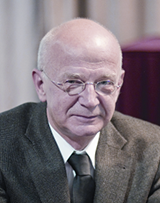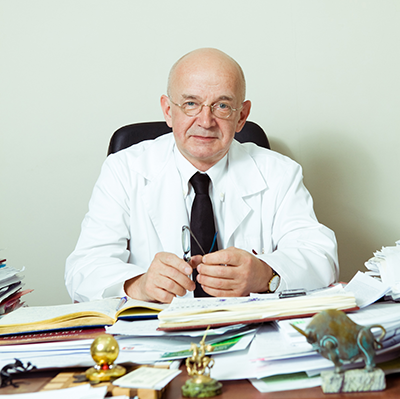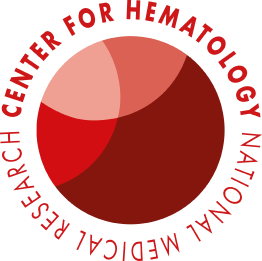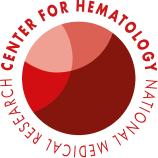
Valeriy G. Savchenko (1952-2021) — Academician of the Russian Academy of Sciences, Doctor of Medical Sciences, Professor, from 2011 to 2021 — General Director of the Federal State Budgetary Institution "Hematological Research Center" of the Ministry of Health of Russia and the Federal State Budgetary Institution "NMRC for Hematology" of the Ministry of Health of Russia
In 1975 Valeriy Savchenko graduated with honors from the I.M Sechenov 1st Moscow Medical Institute with a degree in general medicine.
In 1980 he completed his residency and postgraduate studies at the Department of Hematology and Intensive Care of the Central Institute of Advanced Medical Training and defended thesis for the degree of Candidate of Medical Sciences on the topic "Pathogenesis and treatment of idiopathic thrombocytopenic purpura.” After defending his thesis, he worked as an assistant in the department for seven years, devoted to solving the problem of treating immunocomplex diseases by plasmapheresis.
In 1988, Professor V.G. Savchenko was appointed head of the Department of Hemoblastosis Chemotherapy and Bone Marrow Transplantation of the Hematological Research Center. In 1992 he was named the Chairman of the Research Group of Hematology Centers in Russia.
In 1993 he defended his doctoral dissertation on the topic, "Modern strategy of therapy of acute leukemia.” He was awarded the academic title of professor in 1996 .
In 2004, Savchenko was elected a corresponding member of the Russian Academy of Medical Sciences. The main areas of his research were associated with the development of high-tech, unique and modern programs for the treatment of acute leukemia; hematopoietic depression; the first multicenter cooperative randomized trials in Russia; the practical implementation of new protocols for bone marrow and peripheral blood stem cell transplantation; the development of algorithms for antibiotic therapy; diagnosis and monitoring of the virological status of oncohematological patients; the study of the reconstruction of the immunocompetent system after hematopoietic stem cell transplantation; the development of methods of cellular immunotherapy; and the possibilities of using new targeted drugs.
Professor V.G. Savchenko supervised developments in fundamental research of molecular genetics, cytogenetics, biology, physiology of hematopoiesis, transplantation immunology — detection and monitoring of the residual population of leukemic cells in acute leukemia, chimerism after bone marrow transplantation; studies of the mechanisms of differentiation and apoptosis of tumor cells in myelodysplasia and acute leukemia; induction of antitumor response by dendritic cells; the study of the effects of cytostatic drugs when they affect the endothelium; the study of the systemic effects of growth hematopoietic factors; the study of the mechanisms of immunological control of minimal residual population of tumor cells; mechanisms of antigenic presentation by dendritic cells in hemoblastosis; the study of the mutational status of immunoglobulin genes; and the analysis of methods for genotyping minor histocompatibility antigens for allogeneic HSC transplantation.
Under his leadership, diagnostic algorithms and treatment protocols for diseases of the blood system were developed with an updated two-volume collection published in 2018. Many other programs were also created under his leadership: a program of combined immunosuppressive treatment of aplastic anemia; a program for hematopoietic cell transplantation in a non-myeloablative conditioning regime; a program for unrelated bone marrow transplantation; and a program for the use of mesenchymal stromal cells for the treatment and prevention of the graft-versus-host reaction (GVHD). Furthermore, the basic principles of mobilization and collection of hematopoietic stem blood cells were developed, fundamental results were obtained on chimerism after allogeneic BMT and the possibilities of adaptive immunotherapy with donor lymphocytes in the case of disease relapse after allogeneic BMT, some mechanisms of the cytopathic effect of EBV, CMV, hepatitis B and C viruses were deciphered, and evidence was obtained on the possibility of differentiation of AML tumor cells into antigen-presenting cells.
 Under the guidance of V.G. Savchenko, a unique medical school for our country was created "Leukemias and Lymphomas. Therapy and Basic Research,” through which clinical multicenter studies on the treatment of acute leukemia are carried out. A multicenter study on the treatment of acute leukemia has become the basis for the creation of a Research Group of Hematology Centers in Russia, in which more than 40 hematology centers of our country participate. This group conducts cooperative research on the treatment of aplastic anemia, myelodysplastic syndromes, multiple myeloma, lymphoproliferative diseases, acute mycoses of bone marrow transplantation, and prevention and treatment of infectious complications and lymphomas.
Under the guidance of V.G. Savchenko, a unique medical school for our country was created "Leukemias and Lymphomas. Therapy and Basic Research,” through which clinical multicenter studies on the treatment of acute leukemia are carried out. A multicenter study on the treatment of acute leukemia has become the basis for the creation of a Research Group of Hematology Centers in Russia, in which more than 40 hematology centers of our country participate. This group conducts cooperative research on the treatment of aplastic anemia, myelodysplastic syndromes, multiple myeloma, lymphoproliferative diseases, acute mycoses of bone marrow transplantation, and prevention and treatment of infectious complications and lymphomas.
Through painstaking, cooperative, multi- and interdisciplinary interaction, thousands of patients who have undergone therapy for diseases of the blood system are now living fulfilling lives. V.G. Savchenko also developed a precise tactic for the management and treatment of acute leukemia in pregnant women. The need and effectiveness of chemotherapy was proven to save two lives — mother and fetus. The result of this breakthrough was the possibility of recovery for a third of the sick women, with all of their children born healthy and developing in age. The oldest child is now more than 20 years old.
Under the leadership of V.G. Savchenko, the NMRC for Hematology carried out work on the use of bone marrow and peripheral blood stem cells. This clinic has become a unifying and coordinating center, leading the All-Russian Interregional Registry of Bone Marrow Transplantation. Savchenko was the lead on the registration of all primary cases of acute leukemia, immune thrombocytopenia, multiple myeloma, and eventually the creation of a Register of all primary cases of onco-hematological diseases. He was the head of several RFBR grants (in different years — from 2 to 7 grants).
Along with coordinating organizational activities in the field of bone marrow transplantation, fundamental scientific research was also carried out under the leadership of V.G. Savchenko. The study of the phenomenon of mixed chimerism after bone marrow transplantation allowed us to develop a fundamentally new method of eradication of a leukemic clone through transfusions of peripheral blood leukocytes from an HLA- compatible donors during the period of cytostatic hematopoiesis aplasia. The regularities of the restoration of various hematopoietic progenitors and cell populations of allogeneic BMT were revealed. It was demonstrated that in acute leukemia, even a single appearance of mixed chimerism after BMT is accompanied by a high risk of relapse.
The complex of V. G. Savchenko's works on the study of a residual leukemic clone using methods of molecular genetics, cytofluorometry and cultivation of clonogenic cells allowed us to identify patterns of behavior of a leukemic clone in numerous variants of acute leukemia and multiple myeloma.
Savchenko's clinical interests also included issues of transfusion viral safety. In the course of a long-term clinical and epidemiological study to monitor the virological status of patients with hemoblastosis and hematopoietic depression, extremely important results were obtained on the high probability of infection for recipients of multiple transfusions of blood components with viruses of the main hemotransmissive infections — hepatitis B and C, coinfection with these viruses; quantitative calculations of the basic indicators of the blood service — the residual risk of transfusion infection with hepatitis C virus, the time parameters of the appearance of clinical signs of hepatitis B and C, arising either as a result of reactivation of the pathological process, or primary infection. Based on this research, precision practical clinical recommendations were developed.
For a long time, V.G. Savchenko focused on the challenges of treatment toxicity. Thus, in the course of successive studies on the endothelium and its regeneration, unique data were obtained on the study of kidney tissue damage, on the dynamic study of bone marrow hematopoiesis against the background of chemotherapy and after bone marrow transplantation and on the determination of genetic polymorphism of genes responsible for the metabolism of drugs. The phenomenon of recycling of endothelial progenitor cells after cytostatic exposure was described and the mechanisms of endothelial damage by various cytostatics were revealed. It was also proven that damage to bone marrow tissue after cytostatic effects persists in patients for a long time — up to 7-10 years after BMT. Electron microscopy revealed massive damage to kidney tissue by herpes viruses in patients with signs of impaired renal function in the absence of obvious clinical manifestations of generalized viral infection. Under the leadership of V.G. Savchenko, research on the prevention and treatment of mesenchymal stem cells (MSCs) was also carried out.
As part of the fulfillment of the main tasks and functions of the Chief Freelance Specialist hematologist-transfusiologist, Savchenko carried out an analysis of information on the state of hematological care to the population in the Russian Federation. Based on the data obtained, taking into account domestic and international experience in the field of hematology and in pursuance of appeals and orders of the Ministry of Health of the Russian Federation, changes were made to the Procedure for providing medical care to the population in the "Hematology" profile.
Furthermore, primary and specialized medical care standards in the profile "Hematology" along with clinical recommendations on the main hematological nosologies were also prepared under the leadership of V.G. Savchenko.
A comprehensive analysis of the current list of vital and essential medicines and the list of drugs for the treatment of patients with malignant neoplasms of lymphoid, hematopoietic and related tissues, hemophilia, orphan diseases, as well as after organ and tissue transplantation was also carried out.
In 2015, the Hematological Research Center of the Ministry of Health of the Russian Federation was awarded the status of a federal telemedicine center to provide remote counseling for specialized patients of the Russian Federation. Telemedicine activity under the leadership of V.G. Savchenko has been actively carried out since 1 January 2016, covering all federal districts and regional hematology centers.
V.G. Savchenko paid great attention to teaching and social activities: teaching therapeutic disciplines, including hematology at the Academy of Postgraduate Education of the Ministry of Health of the Russian Federation, lecturing at the Department of Oncology of the Faculty of Postgraduate Education of the Moscow Medical Academy named after I. M. Sechenov.
Under the guidance of V. G. Savchenko, 30 candidate dissertations and 14 doctoral dissertations were defended. V.G. Savchenko holds 14 copyright certificates of invention. He was consistently engaged in teaching with cadet-oncologists and hematologists and carried out active advisory activities in many medical institutions in Moscow and other cities.
V.G. Savchenko was the president of the National Hematology Society, the Moscow Scientific Hematology Society, a member of the Moscow Therapeutic Society, a member of the American Association of Hematologists, the organizer and for more than 20 years Chairman of the organizing committee of the International Hematology School "Leukemia and Lymphoma. Therapy and Basic Research", was a member of the International Committee of the Association for Comparative Research in Leukemia. He was the editor-in-chief of the journal "Hematology and Transfusiology", was a member of the editorial board of the journals "Therapeutic Archive", "Hematology. Transfusiology. Eastern Europe", was a member of the editorial board of the journals "Cellular Therapy and Transplantation", "Biopreparations. Prevention, diagnosis, treatment". Under the chairmanship of V.G. Savchenko, the I, II, III and IV Congress of Hematologists of Russia were successfully held, which are held 1 time in 2 years, increasingly gaining domestic and international popularity and demand.
In 2010 — Full Member of the Russian Academy of Medical Sciences, in 2011 he was elected Academician of the Russian Academy of Medical Sciences, since 2013 — an Academician of the Russian Academy of Sciences.
In 2011, Valery G. Savchenko was appointed General Director of the Federal State Budgetary Institution "Hematological Research Center" of the Ministry of Health of Russia.
Since 2012, he held the position of Chief Freelance Specialist hematologist-transfusiologist of the Ministry of Health of the Russian Federation, since 2017 — Chief Freelance Specialist Hematologist of the Ministry of Health of Russia.
He holds the honorary title "Honored Healthcare Worker of the Russian Federation" (2018), the gratitude of the Health Protection Committee of the State Duma of the Russian Federation of the VII convocation, was awarded the badge "Excellent Healthcare Worker" (2012), the Certificate of Honor of the Russian Academy of Medical Sciences (2011), the medal "In memory of the 850th anniversary of Moscow" (1997).


